12 Best Dog Treats, According to Dog Parents

Photo by Sara Paul
It’s hard to tell who loves dog treats more: the pampered pups or the adoring pet parents.
It’s true: Everyone loves giving a Good Boy or Good Girl a snack! Additionally, treats can make training more exciting and rewarding. However, not all dog treats are created equal. As part of your dog’s diet, treats should be high-quality, wholesome and tailored to your individual pet’s needs. But remember, treats should never make up more than 10% of your furry friend’s diet.
Looking for the best dog treats for your best friend? You’re in luck! We rounded up our most-loved dog treats—as chosen by pet parents like you—as well as expert advice for smart snacking.
12 Best Dog Treats
Best Dog Treat Overall
American Journey with Peanut Butter Grain-Free Oven Baked Crunchy Biscuit Dog Treats, 8-oz bag
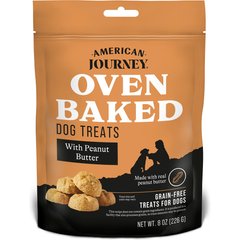
Best Dog Training Treat
Zuke's Mini Naturals Peanut Butter & Oats Recipe Adult Soft & Tender Training Dog Treats, 6-oz bag
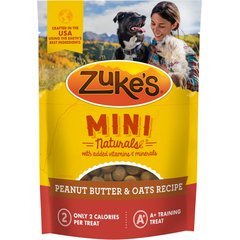
Best Dog Treats for a Puppy
Wellness Soft Puppy Bites Lamb & Salmon Grain-Free Dog Treats, 8-oz pouch
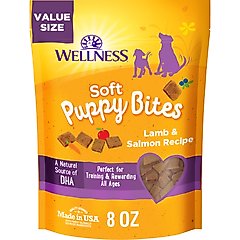
Best Crunchy Dog Treat
Blue Buffalo Health Bars Baked with Bacon, Egg & Cheese Dog Treats, 1-lb bag
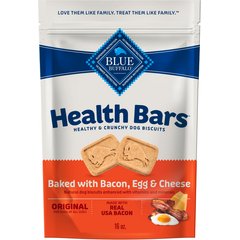
Best Calming Treat for Dogs
Pet Honesty Calming Hemp Chicken Flavored Calming & Anxiety Chews Supplement for Dogs, 90 count
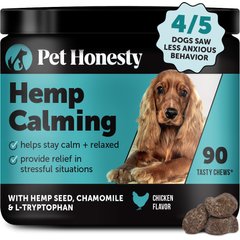
Best Dog Dental Treat
Greenies Regular Natural Original Chicken Flavor Dental Dog Treats, 36 count
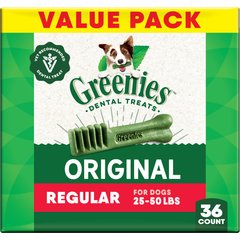
Best Dog Treats for Small Dogs
Fruitables Skinny Minis Pumpkin & Berry Flavor Dog Treats, 5-oz bag
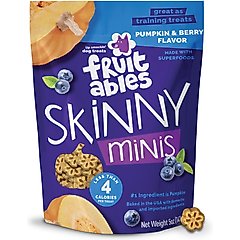
Best Dog Treats for Large Dogs
Old Mother Hubbard by Wellness Classic P-Nuttier Natural Large Oven-Baked Biscuits Dog Treats, 6-lb box
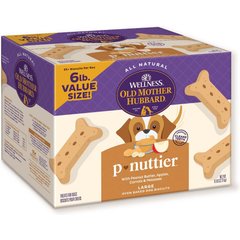
Best Natural Dog Treat
Blue Buffalo True Chews Premium Jerky Cuts Chicken Jerky Dog Treats, 22-oz bag
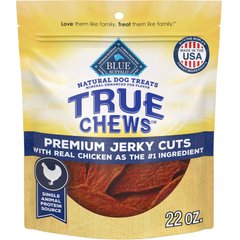
Best Dog Treats for Sensitive Stomachs
Hill's Prescription Diet Hypo Crunchy Dog Treats, 12-oz bag
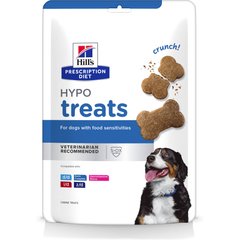
Best Dog Treats for Senior Dogs
Get Naked Biteables Functional Senior Health Real Chicken Recipe Dog Treats, 6-oz bag
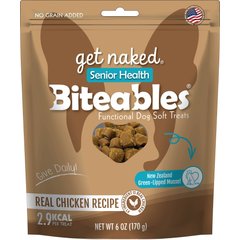
Best Soft Dog Treats
Nutrish Burger Bites, Beef Burger with Bison Grain-Free Dog Treats, 12-oz bag (Rachael Ray)
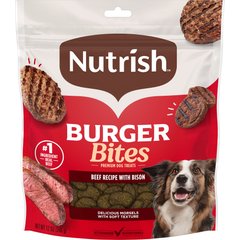
How to Find the Best Dog Treats
Dog treats have come a long way since one-size-fits-all biscuits. Not sure where to start? Here, Ashly Smith, DVM, a Lorton, Virginia-based veterinarian at Small Door Veterinary, shares what to consider when shopping for your four-legged friend:
- Your veterinarian’s advice: When making changes to your dog’s diet, it’s always a good idea to consult your veterinarian. They can recommend trusted treats that are ideal for your pup’s needs.
- Your reason for treating: Why are you giving your dog a treat? Select a treat that’s appropriate for the purpose. For example, when training, choose small treats that you can give multiple times; for dental hygiene, select treats designed to help keep teeth clean.
- Your dog’s size: Make sure to purchase treats that are appropriate for your dog’s size and jaw strength.
- Your dog’s health needs: Consider your dog’s overall health when selecting treats, including food sensitivities, digestive issues and dental concerns. Remember, treats are part of your dog’s diet and should be selected as carefully as the main meal.
- Your pet’s caloric needs: Treats should not exceed 10% of your dog’s daily calories. If you are unsure about your pet’s caloric needs, consult your veterinarian. “Owners should always check in with their vet for a recommended daily calorie intake so they can proportion their meals and treats appropriately,” Dr. Smith says.
Best Dog Treat Overall
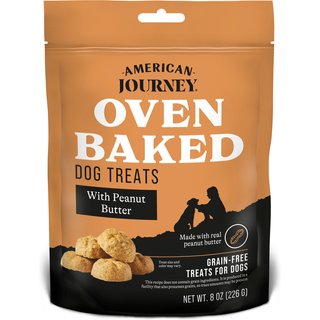
These top-rated treats by Chewy are an all-around winner. With a savory flavor courtesy of real dry-roasted peanuts, they’re grain-free and made in the USA without artificial flavors, preservatives or animal byproducts. Pet parents give high marks for the small size, as well as the pleasant peanut butter scent.
Best Dog Training Treat
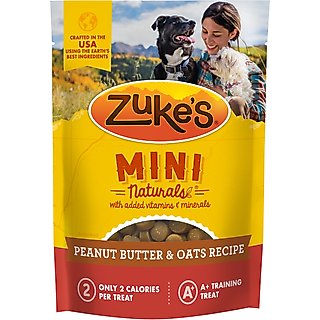
At only 2 calories per treat, these petite snacks are perfect for training your BFF, and contain added vitamins and minerals to support whole-body wellness. Boasting a near-perfect rating, pet parents appreciate their soft, tearable texture and report that pups go wild for the flavor.
Best Dog Treats for a Puppy
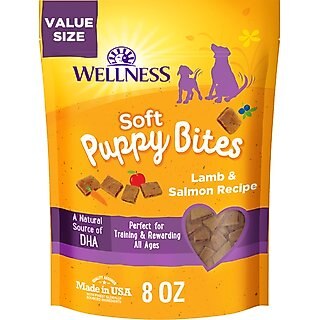
Specially formulated to support the nutritional needs of dogs under 1 year, these bite-size treats are made from natural whole foods, plus DHA to promote brain health and antioxidants for overall well-being. Pet parents appreciate how easy they are to divide, and say their puppies are extra excited for training sessions.
Best Crunchy Dog Treat
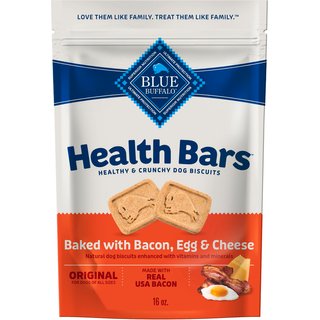
Treat your bestie to the best of breakfast foods! These bacon, egg and cheese-flavored dog biscuits are packed with omega fatty acids, vitamins and antioxidants, and are oven-baked for a satisfying crunch. Reviewers whose pets have food sensitivities appreciate the limited ingredients, and repeat customers say they’ve found their “forever” treat.
Best Calming Treat for Dogs
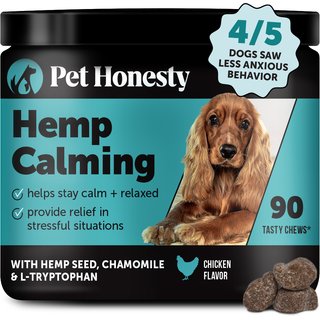
Help flip your dog’s “relax” switch with these top-rated calming treats, crafted with naturally calming ingredients including organic hemp powder and oil, chamomile, ginger and valerian root. Happy pet parents report that these treats have helped manage stressful situations and ease anxiety.
Best Dog Dental Treat
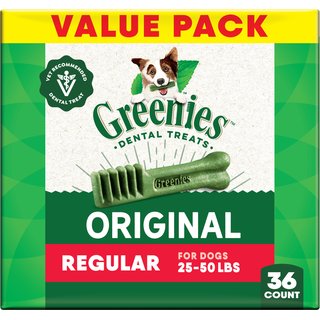
Featuring a unique shape and chewy texture, these fan-fave dental dog chews clean down to the gumline, while fighting plaque and tartar buildup and promoting fresh breath. Pet parents rave about how much their dogs enjoy them, and say they significantly improve their dogs’ breath. Win-win!
Best Dog Treats for Small Dogs
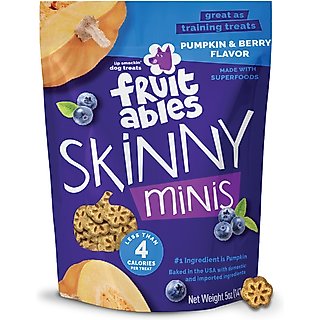
These itty-bitty treats pack a ton of flavor and nutrients in only 3 calories. Appropriate for sensitive stomachs, the limited-ingredient recipe is made with highly digestible sweet potatoes and turkey. Customers with petite pups appreciate the small size, as well as the clean ingredients.
Best Dog Treats for Large Dogs
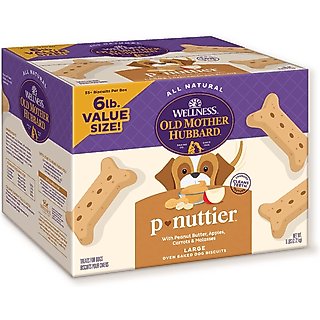
Big buds, these are for you! These large biscuits are made from all-natural ingredients including peanut butter, molasses, apples and carrots, and are slow-baked for a top-notch crunch. Pet parents say their Labradors, Mastiffs, German Shepherds and other large breed dogs love the big size and big flavors.
Best Natural Dog Treat
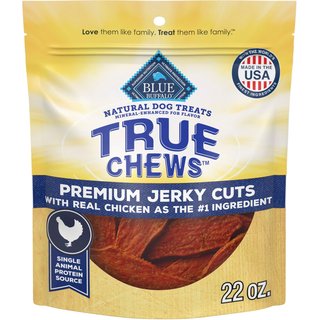
Free of chicken by-product meals, corn, wheat, soy, artificial flavors and preservatives, these premium, high-protein jerky treats are as wholesome as they are tasty. Customers report they’re especially good for pooches with sensitive stomachs.
Best Dog Treats for Sensitive Stomachs
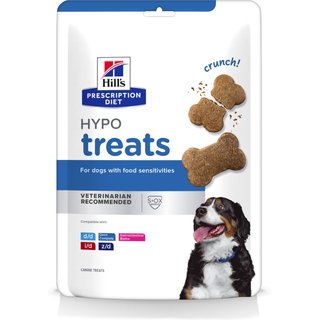
These crunchy biscuits, available with an authorization from your vet, are specially formulated to allow pups with skin conditions and food sensitivities to enjoy a delicious crunchy treat while supporting coat health. Customers report they’re “dog approved,” and are thrilled to treat their pups to a safe and satisfying snack.
Best Dog Treats for Senior Dogs
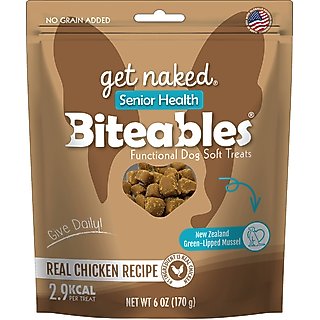
Specially crafted for senior dogs, these chewy treats contain New Zealand green-lipped mussels to support joint health, as well as antioxidant-rich sweet potatoes. Reviewers say even picky eaters gobble them up, and report that the soft texture is easy on pups with missing teeth.
Best Soft Dog Treats
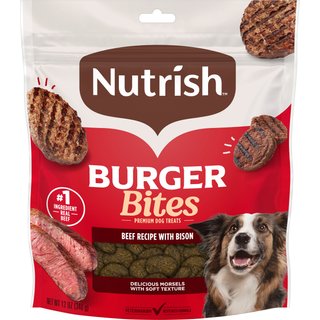
Shaped like mini burgers, these fun treats feature real beef as their first ingredient and have a soft texture that’s easy to break into smaller portions. Happy customers tell us they buy multiple bags to avoid running out, and that their dogs can’t wait for these delicious snacks.
How We Chose These Products
Treats are a fun way to bond with your pet and reinforce good behavior. That’s why we rounded up Chewy’s best-selling dog treats and selected only those that have at least a 4-star rating from satisfied Chewy customers. Backed by hundreds of ratings and reviews, each of these bestsellers are beloved by dogs and dog parents alike.
Types of Dog Treats
What type of treat fits your four-legged friend? From puppies to seniors, playtime to bedtime, there’s a biscuit for every bud.
Training
When training, treats are a great way to reward your dog with positive reinforcement, keeping sessions fun and exciting. However, it’s important to keep calories in mind, which is why training treats tend to be small and low-calorie.
Best for: training exercises; situations where multiple treats will be offered
Crunchy
Crunchy biscuits are classics, and they’ll never go out of style. When dogs chew on crunchy treats, the hard texture helps to remove plaque, stimulate the gums and improve dental health, says Dr. Smith. Crunchy treats tend to be lower in calories than soft options, and many pups enjoy the engaging textures.
Best for: dental hygiene; managing weight
Soft
Just like crunchy treats, soft treats offer unique benefits. Pliable and easy to break into smaller pieces, they can be great for portioning out during training sessions. Soft treats can be easier to chew for dogs with missing teeth and also tend to be highly palatable, says Dr. Smith, making them ideal for picky eaters and pets struggling with appetite.
Best for: breaking apart; dogs who have trouble chewing harder textures; dogs with little appetite
Natural
Natural dog treats are made using minimal ingredients, and contain no artificial colors, flavors or preservatives. While every pet can benefit from clean, high-quality ingredients, says Dr. Smith, natural treats are especially helpful for dogs with food sensitivities, as they contain few ingredients.
Best for: pets with food restrictions; ingredient-conscious pet parents
Dental Treats
Dental treats can help keep your pup’s teeth cleaner, gums healthier and breath fresher. Dental chews are shaped to “scrub” plaque away, and have a crumble-resistant texture that prevents new debris from becoming trapped in the teeth and along the gumline. However, Dr. Smith stresses that they’re not a substitute for regular dental care and cleanings.
Best for: dogs who need a dental hygiene assist; freshening breath
Puppy Treats
Treats designed for puppies are small, soft and squishy–just like puppies! The petite portions make them perfect for puppy training, and the soft texture is ideal for dogs still developing jaw strength.
Best for: training puppies
Senior Treats
Senior dog treats are softly textured for aging jaws, and may contain supplements such as glucosamine and chondroitin to support joint health and other age-related concerns. These treats also tend to be highly palatable, making them ideal for older dogs who have medical conditions that may affect appetite, such as cancer.
Best for: older dogs; dogs who struggle with appetite and/or jaw strength
Calming Treats
For pups who need help relaxing, calming treats may help manage symptoms of stress. They can be especially helpful during anxiety-producing situations. To help you select the best calming treat for your pet, consult your veterinarian and/or certified dog trainer or animal behaviorist.
Best for: helping dogs manage stressful situations
Tips for Feeding Dogs Treats
Everyone enjoys treat time! However, remember that dog treats are part of your pet’s diet, and should receive the same care and consideration as dog food. With that in mind, consider these tips from Dr. Smith.
- Monitor your pet’s weight. Obesity can have serious effects on your pup’s health, so watch the scale and portion appropriately to ensure treats don’t exceed 10% of your pet’s daily diet. “It’s important to be mindful of portion sizes and incorporate treats into your dog’s daily calorie intake accordingly,” says Dr. Smith. “Always check in with your vet for a recommended daily calorie intake so you can proportion meals and treats appropriately.”
- Be mindful of ingredients. Just like meals, treats should be healthy. “Opt for high-quality treats made with wholesome ingredients to ensure they contribute to your dog’s overall nutrition,” says Dr. Smith.
- Divide larger treats as needed. “When it comes to training, using small, bite-sized treats can be helpful in preventing overfeeding while still providing positive reinforcement,” says Dr. Smith. “You can also break larger treats into smaller pieces to make them last longer during training sessions.”
- Think outside the biscuit box. Food isn’t the only type of reward for good behavior. “Consider using alternative rewards such as praise, toys or playtime to vary the reinforcement and reduce reliance on treats,” says Dr. Smith. “Non-food rewards such as extra attention, walks or games can also be effective in reinforcing positive behaviors without adding extra calories.”
- Substitute dog-safe veggies. To mix things up and conserve calories, consider the produce section. “You can use vegetables like carrots or green beans as low-calorie snacks,” says Dr. Smith. See what other vegetables dogs can eat. (Always check with your vet before feeding human food, or any homemade dog food or treat.)
Talk to Your Veterinarian
Every dog is an individual, and what works best for your dog may not work best for another. Before introducing new pet food or treats to your dog’s diet, talk with your veterinarian about your pet’s health needs, caloric intake and weight concerns. Together, you can make sure treat time is, indeed, a treat.
Dog Treats Next Steps
Providing treats is one of the most fun parts of pet parenting. And when you select healthy, high-quality products, it’s even more rewarding. After all, your best friend deserves the best.
Curious to learn more about healthy portion control? Check out our expert guide and discover how much you should be feeding your dog.
Dog Treat FAQs
What are high-value treats for dogs?
High-value dog treats are exciting snacks that dogs will work extra hard to earn. Helpful for training, these treats tend to be highly palatable, chewy and—sorry, pet parents!—extra smelly.
What ingredients should I look for in healthy dog treats?
When shopping for healthy dog treats, look for wholesome, whole-food ingredients such as chicken, salmon or beef, and those that don’t contain fillers, additives, artificial preservatives, colors and flavors. Keeping portion control in mind, and select small treats or treats that can be easily broken apart.
Can you freeze dog treats?
Freezing dog treats can help them taste fresher for longer. Keep the treats in the original packaging and place the package in an airtight freezer container. Before giving your dog a treat, allow it to defrost; frozen treats may be too hard and can damage your pet’s teeth. Even when frozen, treats should not be kept past the expiration date on the packaging.
Attributions
Expert input provided by Ashly Smith, DVM, a Lorton, Virginia-based veterinarian at Small Door Veterinary.
This content was medically reviewed by a veterinarian.



